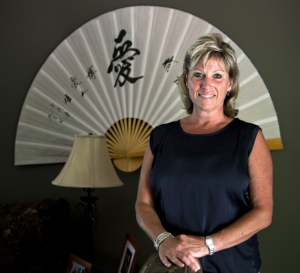Tired of hearing about and seeing children being taken away from their parents and watching children linger for years in foster care, Linda Michie formed her own adoption and family services agency. She is seen here in her home office in Virginia Beach on Tuesday, May 27, 2014. The fan hangs on the wall carries the message: “This home, a happy home.”
Woman starts adoption agency to better help children
By Gabriella Souza
The Virginian-Pilot
© June 12, 2014 VIRGINIA BEACH
Fourteen years into her child-welfare career, Linda Michie found herself at a crossroads.
She’d held a variety of jobs – from child-abuse investigator to trainer and supervisor of volunteers who follow children through the court system – and wasn’t sure of her next move. She also couldn’t shake what she had faced each day: hearing children’s descriptions of abuse, seeing them taken from their families, and then watching them linger in foster care.
Michie longed to put families together instead of watching them fall apart. After years of working in a system she described as taxed, she’d come to believe it could work better with collaboration from private organizations.
So Michie decided to start her own adoption agency.
 A few weeks ago, the license for Wishing Well Adoption & Family Services LLC arrived from the state. It has a staff of one, an office in Michie’s home, where the framed license hangs, and a website constructed with help from her brother.
A few weeks ago, the license for Wishing Well Adoption & Family Services LLC arrived from the state. It has a staff of one, an office in Michie’s home, where the framed license hangs, and a website constructed with help from her brother.
Michie’s small-scale operation sets her apart from the majority of private adoption agencies based in South Hampton Roads. The 10 others, which the Virginia Department of Social Services terms “child placing agencies,” are mostly larger organizations, sometimes faith-based, that are often licensed to aid adoptions in several states.
An agency like Michie’s “is unheard-of,” said Anna Clarke Sas, a family law attorney who also works as a court-appointed guardian for children and others in legal proceedings.
That also makes it challenging. Michie will be the one to meet with every family, train them and counsel them after adoption, a process that could take years. And she’ll have to juggle her adoption work with the parenting classes and other family-related services she offers, all without the support, and financial backing, of a larger organization.
Michie’s past also distinguishes her: She knows firsthand what it’s like not to have a family. She said she became a foster child at 11 in her home state of New Jersey, was emancipated from her family at 14, and spent her teenage years as a runaway.
Many former foster children “want to do something to give back,” said April Dinwoodie, chief executive of The Donaldson Adoption Institute, a research organization based in New York. But Michie is the first she has heard of to start her own agency, especially without being affiliated with a larger organization.
Sas and Dinwoodie agree that Michie’s adoption services agency is needed. About 660 children were in foster care in South Hampton Roads in December, according to data from the Virginia Department of Social Services, which is about 13 percent of the state’s total. Foster children stay in the state’s care more than three years on average. Virginia ranked next to last in the country for foster children per capita who turn 18 without a permanent home, according to one study.
“The more agencies, the better,” Sas said. “That’s the way to get kids out of the system faster.”
Michie didn’t realize the effect her childhood had on her career choice until recently. Instead, she equated it to experience she had as a student at Old Dominion University’s Social Science Research Center. While working on a program with underprivileged children, she started asking questions about child welfare. She received a master’s degree in urban studies from the school in 2002.
After she made the decision to start her own agency, Michie filled out paperwork and formed a business plan at night after her day job. She thinks of Wishing Well as “everything I have to offer all in one place.”
When a family contacts her, Michie will interview them and write a report about their home and family life – called a case study – as well as provide mandated adoptive parent training. Then, because state law does not allow her to charge a fee to find a child for a couple, she will direct them to a state website that lists children waiting for adoption. Later, she will contact the child’s social worker to make a connection. Once a child is in the home, she’ll visit periodically and write reports to a judge to detail how they’re adjusting.
In addition to adoption assistance, Michie offers custody investigations for divorce cases and supervision for visits between children and parents who are working to get them back. She hopes to get on the vendor list for local social services departments.
Sas said the need for supervised visitation is “overwhelming,” pointing out that there has been a backlog among the social services organizations that provide it.
Dinwoodie of The Donaldson Institute said she is encouraged that people such as Michie are stepping out on their own.
“I’m interested to watch how her business develops,” she said.
Gabriella Souza, 757-222-5117, gabriella.souza@pilotonline.com
